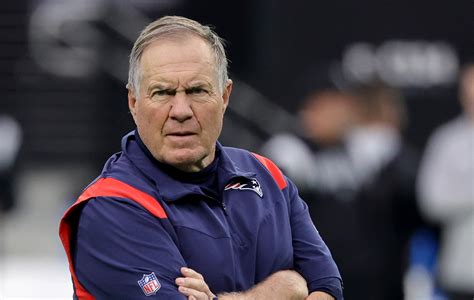
Bill Belichick’s potential involvement with the University of North Carolina (UNC) football program, particularly the hiring of his son, Steve Belichick, and the subsequent departure of offensive coordinator Chip Lindsey, has been described as a “disaster” by some analysts. The situation raises questions about the dynamics within the UNC coaching staff and the implications for the program’s future.
The buzz surrounding Bill Belichick’s potential influence at UNC began when Steve Belichick, former New England Patriots safeties coach and outside linebackers coach, was linked to a defensive role within the Tar Heels’ coaching staff. This sparked considerable speculation about Bill Belichick’s possible role in shaping the team’s strategies and overall direction. Shortly after Steve Belichick’s arrival became a strong possibility, Chip Lindsey, who had been UNC’s offensive coordinator and quarterbacks coach for a single season, abruptly left to take the same position at the University of Central Florida (UCF). While UNC head coach Mack Brown stated that Lindsey’s departure was entirely his decision, the timing of the move, occurring almost simultaneously with the Belichick rumors, triggered concerns among analysts and fans.
The “disaster” narrative stems from concerns about potential disruption to the established coaching structure and the implications of having such a prominent figure as Bill Belichick exerting influence, directly or indirectly, on the program. The perceived issue lies not necessarily with the individual coaches but rather with the unusual circumstances and the potential for imbalance in decision-making power and coaching philosophies.
“There’s no mincing words on this one,” said Pete Thamel, national college football writer for ESPN, regarding the situation. He described it as “a disaster” in a recent discussion, highlighting the oddity of Lindsey’s departure so soon after being hired and the uncertainty surrounding Steve Belichick’s specific role.
The Timeline of Events
The events unfolded rapidly:
- Initial Rumors: Speculation arose concerning Steve Belichick potentially joining the UNC coaching staff in a defensive role.
- Lindsey’s Departure: Chip Lindsey, UNC’s offensive coordinator for a single season, announced his departure to become the offensive coordinator at UCF.
- Belichick Speculation Intensifies: Lindsey’s departure fuels speculation about Bill Belichick’s potential influence on the UNC program, with analysts questioning whether his presence played a role in Lindsey’s decision.
- Official Announcement: UNC formally announces Steve Belichick’s addition to the coaching staff as the outside linebackers coach.
Key Concerns and Potential Implications
Several key concerns have emerged following these developments:
- Coaching Dynamics Disruption: The arrival of a high-profile figure like Steve Belichick, coupled with the possibility of his father’s involvement, could disrupt the existing coaching dynamics and potentially undermine the authority of other coaches. The departure of Chip Lindsey, whether directly related or not, has raised questions about the stability and coherence of the coaching staff.
- Offensive Philosophy Shift: Chip Lindsey’s departure raises concerns about a potential shift in the offensive philosophy at UNC. Lindsey’s expertise and play-calling abilities were expected to contribute significantly to the team’s offensive performance. His exit necessitates finding a replacement who aligns with head coach Mack Brown’s vision and can effectively lead the offense. There’s the added layer of uncertainty: Will Belichick’s defensive influence bleed into the overall team strategy, potentially altering offensive priorities?
- Program Stability: The perception of instability within the coaching staff can negatively impact recruiting efforts and player morale. Potential recruits may be hesitant to commit to a program undergoing significant changes, and current players may become concerned about the team’s direction and future prospects.
- Head Coach Authority: The presence of Bill Belichick, even in an advisory role, could potentially overshadow head coach Mack Brown’s authority and decision-making power. While Brown is a highly respected and experienced coach, the immense reputation and coaching acumen of Bill Belichick could inadvertently create a perception of diminished control for Brown.
- Recruiting Impact: Uncertainty stemming from coaching staff changes can negatively impact recruiting. High-profile recruits may be wary of joining a program perceived as unstable or influenced by external figures. Conversely, some recruits might be drawn to the opportunity to learn from a coach with the Belichick pedigree.
- Offensive Continuity: The abrupt departure of an offensive coordinator after just one season disrupts the continuity of the offense, potentially hindering player development and the implementation of a cohesive offensive strategy. The team must adapt to a new offensive system and play-caller, which can be challenging and time-consuming.
Mack Brown’s Perspective
UNC head coach Mack Brown has publicly addressed the situation, attempting to downplay concerns and emphasize his control over coaching decisions. Brown stated that Chip Lindsey’s departure was solely Lindsey’s decision, and he wished him well in his new role at UCF.
However, despite Brown’s assurances, skepticism persists among analysts and fans, who find the timing of Lindsey’s departure and the potential influence of the Belichicks too coincidental to ignore. The lack of a readily available explanation from Lindsey himself has fueled further speculation.
Chip Lindsey’s Departure
Chip Lindsey’s decision to leave UNC after just one season was unexpected, particularly considering the potential for building a successful offensive program with talented players like quarterback Drake Maye (who has since moved on to the NFL). Lindsey’s offensive schemes were generally well-received, and he was seen as a promising addition to the UNC coaching staff.
His move to UCF raises questions about the reasons behind his departure. While UCF is a program with its own appeal, including a strong recruiting base and a growing national profile, it is not generally considered a significant step up from UNC in terms of prestige or resources. The timing of the move suggests that factors beyond mere career advancement may have played a role in his decision.
Steve Belichick’s Role
Steve Belichick’s arrival at UNC as the outside linebackers coach brings a wealth of experience and expertise to the Tar Heels’ defense. He spent over a decade with the New England Patriots, working under his father and gaining a reputation as a skilled defensive strategist.
His specific responsibilities and influence within the UNC defense remain to be seen. However, his presence is expected to enhance the team’s defensive capabilities and provide valuable insights into game planning and player development. The key question is how his contributions will integrate with the existing defensive philosophy and whether his presence will lead to significant changes in the team’s defensive schemes.
The Bill Belichick Factor
The potential involvement of Bill Belichick, even in an unofficial capacity, looms large over the entire situation. Belichick’s unparalleled success in the NFL, including six Super Bowl victories with the Patriots, makes him a highly sought-after advisor and mentor.
His potential influence on the UNC program raises both excitement and concern. On the one hand, his expertise could provide invaluable guidance to the coaching staff and help elevate the team’s performance. On the other hand, his presence could create a perception of undue influence and potentially disrupt the existing coaching dynamics.
Impact on UNC’s Future
The events surrounding the coaching staff changes at UNC have significant implications for the program’s future:
- Short-Term Uncertainty: The immediate impact is a period of uncertainty as the team adjusts to the new coaching structure and offensive philosophy. The coaching staff must work quickly to establish a clear direction and ensure that the players are fully aligned with the new approach.
- Long-Term Potential: In the long term, the changes could potentially benefit the program if the new coaching staff can effectively leverage their expertise and build a cohesive team. However, if the changes lead to further instability or a decline in performance, it could negatively impact the program’s trajectory.
- Recruiting Challenges: The coaching staff must address any concerns among potential recruits and reassure them that the program is stable and committed to success. They must also highlight the opportunities for players to develop under the guidance of experienced coaches like Steve Belichick.
- Fan Expectations: The changes have heightened fan expectations, with many hoping that the Belichick influence will translate into improved performance on the field. The coaching staff must manage these expectations and deliver results to maintain fan support.
Analyzing the “Disaster” Narrative
The “disaster” narrative surrounding the UNC situation is likely an overstatement, but it reflects the legitimate concerns and uncertainties that have arisen from the coaching staff changes. While the situation is not necessarily a full-blown crisis, it does present challenges that the coaching staff must address effectively to ensure the program’s continued success. The key will be how Mack Brown manages the new dynamics within his staff and how he integrates the expertise of Steve Belichick without disrupting the overall team cohesion.
The Perspective of Other College Football Programs
The situation at UNC is being closely watched by other college football programs, who are curious to see how the changes will impact the Tar Heels’ performance and recruiting efforts. The outcome could potentially serve as a case study for other programs considering similar coaching arrangements or collaborations with high-profile figures. Some may view it as a bold move that could pay off handsomely, while others may see it as a risky gamble that could backfire.
Possible Scenarios Moving Forward
Several scenarios could unfold in the coming months:
- Seamless Integration: The coaching staff seamlessly integrates Steve Belichick into the defensive structure, and the team experiences improved performance on the field. Mack Brown maintains control over the program, and the Belichick influence proves to be a positive addition.
- Internal Conflict: Internal conflicts arise within the coaching staff due to differing philosophies or power struggles. The team’s performance suffers, and recruiting efforts are negatively impacted.
- Offensive Stagnation: The offense struggles to adapt to the new coordinator, and the team’s scoring output declines. The departure of Chip Lindsey proves to be a significant loss.
- Defensive Transformation: Steve Belichick implements significant changes to the defense, resulting in a dramatic improvement in the team’s ability to stop opponents. The defense becomes a dominant force, compensating for any offensive shortcomings.
- Status Quo: The team’s performance remains relatively unchanged, and the coaching staff changes have little impact on the overall program. The situation becomes a non-event.
Conclusion
The coaching staff changes at UNC have created a complex and potentially challenging situation for the program. While the “disaster” narrative may be an exaggeration, it is essential to acknowledge the legitimate concerns and uncertainties that have arisen. The key to success will be effective leadership, clear communication, and a commitment to building a cohesive team. The coming months will reveal whether the changes prove to be a positive turning point or a setback for the UNC football program. The dynamic will be monitored not just by the UNC fans and staff, but by college football programs around the country. The lessons learned, whether positive or negative, from this unique coaching situation will be valuable.
Frequently Asked Questions (FAQs)
1. Why is Chip Lindsey leaving UNC after just one season?
Chip Lindsey’s departure remains somewhat unclear. While UNC head coach Mack Brown states it was Lindsey’s decision, the timing, coinciding with rumors of Steve Belichick joining the staff, has fueled speculation. He accepted the offensive coordinator position at UCF. No explicit reason for the move has been provided publicly by Lindsey himself, adding to the mystery.
2. What role will Steve Belichick have at UNC?
Steve Belichick will be the outside linebackers coach at UNC. His specific responsibilities will include coaching the outside linebackers, assisting with defensive game planning, and contributing to the overall defensive strategy. How much autonomy he will have in implementing changes and shaping the defense remains to be seen.
3. Is Bill Belichick officially involved with the UNC football program?
As of the latest reports, Bill Belichick does not hold an official position with the UNC football program. However, the possibility of him serving as an advisor or consultant has been widely speculated, given his son’s presence on the coaching staff. His level of involvement, if any, remains uncertain.
4. How might these coaching changes affect UNC’s recruiting?
The coaching changes could have both positive and negative effects on recruiting. The uncertainty surrounding the offensive coordinator position might deter some offensive recruits. On the other hand, the opportunity to learn from Steve Belichick, and potentially gain insights from Bill Belichick, could attract defensive recruits. Overall, clear communication from the coaching staff to recruits will be crucial to manage any concerns.
5. What is the biggest concern about the Belichicks’ involvement at UNC?
The biggest concern revolves around potential disruption to the existing coaching dynamics and the authority of head coach Mack Brown. The concern is that Bill Belichick’s reputation and experience could overshadow Brown’s leadership and create an imbalance in decision-making. Furthermore, a shift in coaching philosophies could create friction within the staff and ultimately affect the team’s performance.









